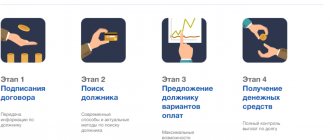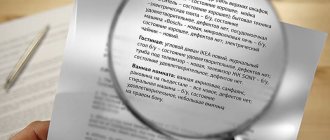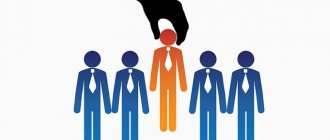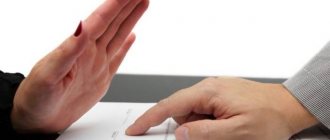Let's look the enemy, that is, debts, in the face
As they say, the devil is not as scary as he is painted. Before you start distributing debts, you should clarify what, to whom and in what amount you owe. It is advisable to write down all the data about your loans and debts that you need to get rid of in the form of a table. It may contain, for example, the following columns:
- Lender's name.
- Basic loan amount.
- Interest rate.
- Amount of overpayment.
- Monthly payment amount.
- The period when the debt must be repaid (if a loan, then the date of the next payment and the total duration of the loan).
- Notes.
It is better to leave the last column wide, since in it you will mark all events related to the loan, for example, “Delay granted,” “Repay urgently,” or “Repay first.” It is most convenient to compile such a table first on paper and then transfer it to Excel.
Next, you need to analyze the work performed. In principle, when you organize your debts, it will become clear exactly how much you pay per month and how long this situation will continue. You will also see the most expensive loans (with a high interest rate) and loans with the largest overpayment (their rate may be lower, but due to the long loan term the overpayment will be higher). We’ll talk about what strategy to repay loans later.
Where to get finance to pay off debts?
How can you avoid getting into such a situation or get out of credit debts? If you're finding it difficult to pay your bills, there are options to increase your income and cut expenses. Also, banks are usually interested in offering more favorable conditions to such a client.
So, first you need to understand your existing finances:
- Make a plan for your expenses and income for the month, this will help you get rid of unplanned expenses.
- Find an additional way to earn money, this could be an extra shift at work, working on the Internet, or you could ask your boss for a raise. Direct all additional funds to pay off accumulated debts and loans.
- Do not buy expensive things, refuse paid entertainment, try to make purchases more economically.
Now let's look at the opportunities provided by banks to pay off debts and loans. Each bank is interested in the borrower repaying his loan debt in full, so he always offers the problem borrower more favorable conditions if he needs them.
Options that the bank can offer:
- Loan restructuring – re-issuance of a loan agreement under more favorable conditions;
- Debt refinancing is the transfer of loan debt to another bank, which can change the terms of the loan agreement;
- Taking out another loan is a dangerous method that can drive you into even more debt and debt.
We create a payment calendar
The next step is to create a payment calendar.
You can mark payment dates on any wall calendar or draw a special sign. The latter is convenient, since in addition to loans, you can enter into the table any other mandatory expenses - rent, for example, as well as income - salary, advance payment, etc. As a result, you will see on which days you have income and on which days you have mandatory income payments, how they are grouped, whether you have enough funds to pay off many payments in one week. Now you can plan. For example, salaries are calculated at the beginning of the month, while loans are paid in the middle and at the end. You will be able to set aside the required amount in advance.
It is especially convenient to use the sign when you have many payments. Then you will definitely not get confused and will not miss the date of the next payment due to forgetfulness.
We deal with current debts
If, in terms of loans, the situation is so deplorable that there is nothing to pay off the loan, and the amount of fines has long exceeded the payment itself, collectors spend the night at your entrance, and relatives refuse to let you in for dinner until you pay off the debt, then you should figure out the situation and how to get out of it. debts with minimal losses.
The best solution would be to openly admit your financial insolvency and negotiate with creditors. If you borrowed from friends and relatives, you can agree to write off interest and pay in installments. If there are a lot of loans, you can ask banks for a deferment or refinance.
But you shouldn’t relax as soon as the credit ties loosen a little. This is not the time to waste money. The freed funds should be used for early repayment of debts. For example, you have three loans of 10, 5 and 4 thousand rubles, and your net income (i.e. free money) is 17 thousand. You agreed to defer the second loan of 5 thousand rubles for a period of six months. Your payment became not 19, but 14 thousand rubles. The freed 3 thousand should be used for early repayment of one of the loans or put aside in a special account to form a financial cushion. But you can't spend them.
If your debt is sold to collectors or banks have assessed too many fines, then it is better not to pay on these loans for now, but to go to court. Usually judges “write off” all sorts of penalties, especially if they are not provided for in the contract. It is often possible to reduce the monthly payment to a minimum by lowering the interest rate or increasing the loan term.
The essence of the debt hole
The modern understanding of the concept of “debt (credit) hole” is circumstances when the debtor is unable to repay the loan debt, while the total debt grows due to fines and penalties for late payments. Therefore, the borrower takes out new loans to pay off the previous ones and digs deeper into the credit hole.
Until the end of the 19th century, debtor prisons existed in Russia for people who owed a lot of money to creditors. Interesting fact: the debtor was sent to debtor's prison along with his family. The imprisonment lasted at the discretion of the creditor until the debt was repaid by relatives, friends or acquaintances. Only with the permission of the creditor could the debtor leave debt prison in order to work off the amount of debt.

The debtor's prison was a special cell located underground. A special room was allocated for each class. This is how the concept of “debt trap” appeared, which struck fear into unlucky entrepreneurs and young people who wanted to get rich quickly and squandered their family money.
We carry out refinancing
If there are a lot of payments and the interest on them is high enough, then it is necessary to refinance. There are several ways to do this:
- take part in a special program of the creditor bank;
- take part in a third-party bank’s refinancing program;
- take out a loan on your own at a lower interest rate and pay off current debts with the funds received.
Since the borrower himself is unlikely to be given a new loan with current debts, a new one is usually issued to a relative or friend. You should calculate the benefits - independent refinancing is beneficial if the total loan term does not increase, and the new rate will be more than 3 points lower than the current one. In other words, if a loan is taken out for 5 years at 33% per annum, and refinancing is carried out the next year, then its parameters should be as follows: term - no more than 4 years, rate - no more than 30% per annum. Otherwise you will have to pay interest again.
Of course, if the situation is critical and the monthly payments are too high, then any way to reduce the financial burden is suitable. To the point of asking the bank to increase the loan term - the total overpayment will increase, but the monthly payment will decrease.
By the way, during refinancing you can try to postpone the payment date. It is more convenient to pay off all loans in one day and try to receive income just in time.
It is optimal to refinance using a special program. Then it will be possible to combine all the loans into one, and the overpayment will be minimal. It is much easier to get approval for a transaction from “your” bank.
Consequences of ignoring debts
You shouldn’t forget about credit debt because of your financial crisis; on the contrary, you need to look for an opportunity to get out of the debt hole. Before declaring yourself bankrupt or suing the bank, try to resolve the situation peacefully.
To do this, you can come to the bank where you took out the loan and, with reasoned reference to your new reduced financial capabilities, ask for a deferment on the loan or to select one of the ways to restructure the debt.
If you are going not to pay your existing debt to the bank, you must be prepared for the following:
- Your credit history will be damaged (most likely you will no longer be given a loan);
- Your reputation is damaged (there may be problems with traveling outside the country);
- Waste your nerves and possibly get a criminal record;
- Your property and finances may be written off as debt.
We draw up a loan repayment plan
The next step is to decide on a debt repayment strategy. The most optimal would be the following three schemes:
First, the largest loan is repaid , then the second largest, then the third, etc. The good thing about this method is that the monthly payments are reduced and free money is released. Disadvantage: you will have to wait quite a long time until the first loan is paid off.
Small debts are repaid first , then the largest ones. The good thing about this method is that it is easier to “close” small loans, and the borrower himself has a growing sense of satisfaction from the reduction in the number of payments. Disadvantage: the final overpayment will be higher.
The most expensive loans (i.e. those with the highest interest rates) are repaid first, regardless of their size. This method is the most optimal, based on cost savings. Disadvantage: The most expensive loan may also be the largest, and the monthly payments will not decrease quickly enough.
All loans are repaid evenly. For example, 1-2 thousand are paid monthly in excess of the payment amount. Advantages: systematic reduction of payments. Disadvantage: each time you will have to make an early repayment and overpay on possible commissions.
Which method is more convenient is at the discretion of the borrower. The main thing is to develop a convenient strategy and not deviate from it.
Let's stop increasing debt
Taking out a loan to pay off another loan is a bad practice (unless, of course, refinancing is done). Therefore, you need to immediately refuse loans and credit cards. If you have credit card debts, they need to be repaid first, regardless of the size of other loans. The cards have the most unfavorable tariffs, and the overpayment on them is simply huge. It is better to get rid of debts to the bank immediately.
Of course, we need to stop paying in stores with credit cards. Only debit with cash-back or, at worst, cash.
Sale of collateral
This method of getting rid of debt is suitable for those who took out a mortgage or a car loan; the car and real estate, respectively, remain pledged to the bank. If it becomes impossible to repay the loan, the only way out is to sell the mortgaged property. Because the property is pledged, prohibitions are imposed on alienation transactions of any nature, the operation is possible only with the consent of the bank.
A borrower who has fallen into a debt trap finds a buyer who pays the balance of the loan. Part of the amount from the transaction is used to pay off the debt, and part is transferred to the former borrower. This option is more profitable compared to waiting for the bank to file a lawsuit and selling the property at auction.
We cut costs
If you decide to get out of debt, you will have to learn to save. Here are some ideas on how you can save money:
Disable all unnecessary payments. For example, if you don’t listen to the radio, then dismantle the radio station. Don't pay for cable if you turn on the TV once a month. Turn off mobile banking if you receive a salary once a month - you will still perform all transactions via the Internet.
Change your tariffs to more favorable ones. Take the time to find out if there may be better tariffs for telephone, Internet and cable. Sometimes you can take part in special programs for the holidays.
Make a list of mandatory monthly expenses (everything, including rent and childcare fees) and think about where you can save money. For example, if you fill up for 2,000 rubles a month, wouldn’t it be more profitable to buy a transport card for 500 rubles and use the bus? Maybe not as convenient, but cheaper. Or try to transfer your child from a paid section to a free one, if the quality of his education does not suffer.
Save water and electricity , no matter how trivial it may sound. Turn off unnecessary lights and electrical appliances, and turn off the water when brushing your teeth. Of course, you won’t save significant money, but even 500 rubles a month won’t be superfluous - you’ll find something to spend it on. If possible, switch to a two-tariff meter and make household appliances work at night - for example, a washing machine.
Refrain from unnecessary purchases . Go to the store only with a list of products - this will protect you from accidental purchases. Plan right away what you will cook during the week. It is optimal to generally allocate a weekly budget “for food” and not exceed it.
Love sales . This applies to the purchase of food, clothing, and household goods. Buy more than you need at once so that you don’t overpay next time. But don't go over budget!
Get a card with cash back and interest on the balance. Make purchases only from it. This will contribute a pretty penny to the family budget.
As a result, if you follow all these recommendations, you can “find” free 2-3 thousand rubles in your own budget. And you already know where to spend them.
How to get out of debt forever
Einstein said: it is madness to do the same thing and expect different results. If the situation in your life is repeated and you still have to ask your relatives to lend money before payday, this means that something needs to change in your life. In fact, whether to live in debt or not is a choice, not a necessity. Do you want to get out of the hateful loop? Please, an action plan on how to get out of debt.
We are afraid to watch horror films, although they are fantastic. Why? The mind believes that it hears, sees, etc. .. thinks for its owner. So, a person who constantly thinks about debts remains in the role of someone who has lost them, while the absence of negative thoughts has an excellent chance of winning. Neuroscientists have long discovered that words and thoughts increase self-confidence by influencing nerve cells in the brain, thereby changing behavior patterns and habits.
- We stop lending
From now on, we don’t even try to artificially create even more debts than we currently have. Leave your credit card in a locked drawer and lose the key. From now on, do not take anything on credit, do not use an overdraft on your account.
No, bankers, even at zero percent! Implementing the decision will initially be quite difficult. However, this is a necessary step towards independence and freedom from loans.
- Getting rid of the snowball of loans
Let's start using the Home program. online accounting plan debt repayment. Often a person has several loans from different banks. Write them down from smallest to largest. According to the loan agreement, everyone has a minimum payment that will have to be paid. Focus on small payments and budget for a larger monthly repayment amount. Thus, the actual release from financial obligations begins. Of course, continue with your other commitments. Once you've paid off your smaller loan, focus on the next thing. By adding to each installment an amount no less than what was paid when paying off the previous debt. So the “snowball”, layer by layer, gradually melts.
- Treat yourself!
Having paid off all the loans, replace the free approach to money management with a more conscious one. Allow any (!) amounts in the first month of freedom, be it for a new pair of shoes, movie tickets, or even a hot donut in an underground passage!
Believe me, you will be amazed when at the end of the month you see that you prefer...quality: better quality tea, a weekend getaway with your family, digital TV, even dinner with red wine...different, better quality! You can give yourself and your family all this! Ready? Get to work!
Follow the same snowball principle, only now put the money aside in a personal account or in another safe place. This creates the need for a personal financial plan, where there is room for the notorious 5% for unforeseen expenses like a doctor's visit or attending your best friend's wedding.
Woody Allen was right when he said that “money is better than no money, at least for financial reasons.” Getting out of debt is the easiest way to get money quickly.
Igor Nikolaevich especially for the site Where to get money










